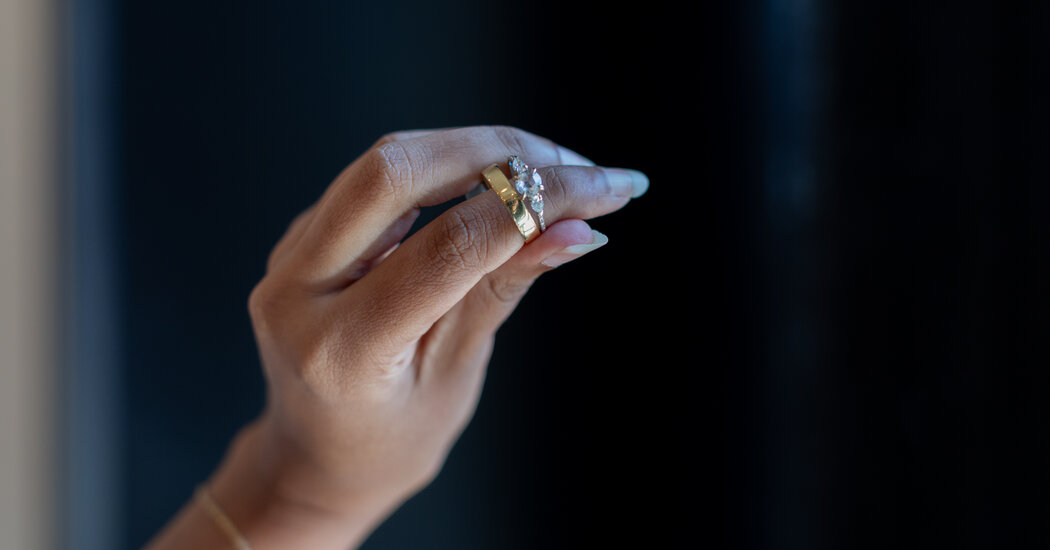Until last year, the Watches and Wonders Geneva watch fair was closed to the public.
Brands, retailers, media and some V.V.I.P. s were granted entry, but regular watch buyers? Would-be watch enthusiasts? It seemed like Switzerland’s reputation for behind-closed-doors dealings was dictating watch show policy, too.
But that all changed last year when a new organizing committee decided to sell tickets to the public for the event’s weekend days, an arrangement that was extended to three days this year.
Today is the last of those — and the show’s final day — but it may not be the quietest. Even at 70 Swiss francs ($77) for the most expensive adult day pass, organizers had been expecting to sell out, and there was talk of welcoming local school groups.
Here is what some of the 54 exhibiting brands have been showing.
Moon Shots
At its heart, Watches and Wonders Geneva is devoted to high-end watchmaking, which typically means high-end prices, too. But as exhibitor numbers have climbed, the price spectrum has widened, even when brands have been tackling some of watchmaking’s most niche complications. The mechanical half-dozen below all feature moon phases, a display showing the waxing and waning of the moon, which arguably is the most poetic (read: unnecessary) of watchmaking functions. Yet the prices aren’t all sky-high.
Patek Philippe 5236P-010 In-Line Perpetual Calendar
Collectors of Patek Philippe reference numbers will recognize that 5236P is not new to the family-owned company’s lexicon. In fact, it was introduced three years ago, when Patek first exhibited what it calls its In-Line Perpetual Calendar. Then, as now, the watch showed the day, date and month on one line, seen through a single dial aperture. That sounds straightforward enough, but Patek had never done that before and, the brand said, it required an additional 118 components. The new model being a perpetual calendar, it will track the date and phases of the moon through leap years without the need for fiddly adjustments (assuming the timepiece is kept wound). Novel this year is the material mix: the 5236P’s platinum case is now joined by an opaline rose-gilt dial with charcoal gray white gold hands and hour markers.
$141,405
Jaeger-LeCoultre Duomètre Heliotourbillon Perpetual
How many axes does a tourbillon need? Among those asking the question — and there won’t be many — is Jaeger-LeCoultre, whose dizzying newcomer features a tourbillon with three axes. It’s named this Heliotourbillon, a figurative reference to the parallel roles played by the sun and a watch’s regulating organ in controlling the systems that depend on them. The brand said that pairing this feature with the brand’s Duomètre technology, which powers time keeping and additional functions separately, makes the new watch more accurate. That may be true, although most prospective buyers first will be drawn to the Heliotourbillon, visible at 9 o’clock: a whirling conglomeration of tiny components that indicates the passing seconds with three red triangles on the third cage pointing to a 20-second scale hovering over a blue-lacquer starry-sky background. The watch is also a perpetual calendar with a moon phase and a grande date, a large-scale display using two disks. Its full-year indication has a patented display that shows the last digit of a leap year in red. A technical tour de force.
Price on application
Laurent Ferrier Classic Moon
Laurent Ferrier’s sober designs are often overshadowed by the esoteric creations of its fellow Swiss independents (MB&F, Urwerk and others), but it leaped into the limelight when its Grand Sport Tourbillon Pursuit took the tourbillon prize at the 2023 Grand Prix d’Horlogerie de Gèneve (G.P.H.G.), an annual industry awards event. Purists’ purring over that model could be heard well beyond the Alps, and the same will be true of the new Classic Moon, the company’s first moon phase. Its soft, pebble-edge form will be familiar to the brand’s acolytes, so attention must fall on the twin moon phase indication at 6 o’clock. It shows the moon’s 29.5-day cycle in both the Northern and Southern hemispheres via a hand-engraved aventurine disk coated in luminescent material and then engraved by hand again so the craters glow in the dark.
$75,000
Baume et Mercier Riviera Calendrier Perpétuel
Baume et Mercier’s Riviera is rarely mentioned in conversations about 1970s luxury sports watches, and yet the watch with the dodecahedral bezel named for the French Riviera predates more celebrated designs such as Nautilus, Ingenieur, Laureato and Polo. Last year, Baume et Mercer marked the half-century of its watch with a 50-piece limited-edition perpetual calendar model. This appears to have generated significant interest, because the design joins the core collection this year, now with a slate gray dial and golden detailing. Inside it continues to have a version of the parent-company Richemont’s five-day, antimagnetic automatic movement, which Baume et Mercier calls Baumatic. Here, it has been upgraded to offer a perpetual calendar complication, complete with a moon phase at 6 o’clock. Despite appearances, it is a perfectly reasonable 40 millimeters across and 11.8 millimeters deep, perhaps made to look bigger by those 12 flanks.
$21,000
Frederique Constant Classic Moonphase Date Manufacture
Is this the second coming of Frederique Constant? The Geneva company was founded in 1988 as mechanical watchmaking began its post-quartz revival, and by the 2000s had become part of a zeitgeist-y new generation of so-called “affordable luxury” mechanical watch brands. That story went stale eventually — in part, as the company labored to promote hybrid watches that married mechanical and smart tech — and a tired Frederique Constant was sold to the Japanese watch giant Citizen. Now there’s fresh energy in the brand, which continues to focus efforts around its core Classic line and the in-house movements it offers. This moon phase model isn’t new, but with upgrades to its dial finish, a 72-hour power reserve and five-year warranty, it reminds longtime industry observers what was so good about Frederique Constant in the first place.
$4,095
Raymond Weil Millesime Automatic Moon Phase Midnight Blue
The fact that Raymond Weil is debuting among the exhibitors at Switzerland’s premier watch fair has to be judged as a smart play by the family-owned company. It follows a win at the 2023 G.P.H.G. awards for the brand has called its “neo-vintage” Millesime, a design that not surprisingly became the impetus for its new collection. There are 12 new references, all priced at less than $4,000, including this 39.5-millimeter moon-phase edition with a rose-gold stainless steel case with P.V.D. (physical vapor deposition) coating. And there will be a smaller 35-millimeter version with lab-grown diamonds set into the lugs. Using the Millesime as a platform for growth seems sensible, but some will wonder why the watch comes with a power reserve of only 38 hours, even if it does keep costs down.
$2,325
The Usual Suspects
There are countless factors behind the fervor for luxury mechanical watches over the past decade or two, but two of the most significant are the consistent reinvention of many of the watch industry’s historic dial names and the continued investment by brands whose reputation for luxury expands well beyond watchmaking’s walls. Together, they have made watchmaking bankable.
Cartier Santos de Cartier GMT
The squarish design of Cartier’s Santos may have been around for more than a century, but the Paris house insists this is the first time it has paired the celebrated design with a GMT function, or second time zone display, considered by few to be watchmaking rocket science. It features in a stainless steel model in shades of gray that also includes a day/night indicator that’s governed by the second time zone.
$9,150
Vacheron Constantin Traditionnelle Tourbillon Chronograph
Every now and again Vacheron Constantin upscales one of its models to Excellence Platine status for the benefit of its army of collectors. The formula: add platinum to the case, crown, dial and even the strap stitching, and reduce production volumes. The Traditionnelle Tourbillon Chronograph is the latest to go under the platinum scalpel, and is limited to 50 pieces.
Price on application
Chanel Monsieur de Chanel Superleggera Edition Intense Black
One wonders just how lauded Chanel’s men’s watch would be if it wasn’t so overshadowed by the J12. But now, some light for the Monsieur, which this year has been given the Superleggera, or lightweight, treatment, first added to the J12 in 2005. In black ceramic and steel, this new model weighs a modest 82 grams (2.9 ounces). Only 100 will be made.
$46,500
Zenith Defy Extreme Diver
Zenith’s sports watch design strategy has taken a deeper breath this year with the introduction of a 42.5-millimeter titanium version of its Defy that is water-resistant to 600 meters (and features a helium escape valve, useful only to saturation divers). Mathematical minds will have spotted that 600 meters is 1,969 feet, which the brand has said is no coincidence given that 1969 was the debut of Zenith’s El Primero high-frequency movement and its first Defy Diver.
$11,300
Montblanc Iced Sea 0 Oxygen Deep 4810
Sticking with the theme of tying significant numbers to water resistance, enter Montblanc’s latest Swiss Made lung-buster, said to be good to 4,810 meters (15,780 feet) of underwater activity, a figure that just happens to mirror the height of the French mountain used to name the German company. The oxygen-free insides of the chunky titanium watch are said to prevent fogging and reduce wear.
$9,100
Panerai Submersible QuarantaQuattro Luna Rossa Ti-Ceramitech
Apparently it took seven years for Panerai’s Laboratorio di Idee to perfect the Electrolytic Plasma Oxidation titanium ceramization process that gives the company’s new Ti-Ceramitech material its bluish hue. The marine color goes well with Panerai’s sponsorship of the Luna Rossa Prada Pirelli America’s Cup team, while the material is said to be 44 percent lighter than steel and 10 times more fracture resistant than ceramic.
$16,500
Roger Dubuis Orbis in Mechanica
Makers of so-called hyper horology owe a debt to Roger Dubuis, one of the earliest pioneers of experimental watch and movement design. The company’s latest hyperwatch pops a flying tourbillon into the middle of the picture, with seconds, minute and hour indications on scales that emanate from the center in concentric circles, all enclosed in a 45-millimeter by 14.4-millimeter hunk of pink gold.
$225,000
H. Moser & Cie Streamliner Tourbillon Skeleton
The Streamliner, Moser’s critical and commercial hit, has become a totem for the independent watchmaker in double-quick time, thanks perhaps to its adherence to the company’s minimalist design approach. So it was a bold move to blend the fluid form of the Streamliner case with the filigreed eccentricity of a skeletonized tourbillon. But it works.
$86,900
‘Dune’ and Dusted
If three’s a trend, what is four? In fact, the list of sand-color (beats beige) watches admitted to the watchmaking canon this spring extends well beyond this quartet: IWC’s Portugieser now includes a “Dune” series; while away from the fair, Audemars Piguet last month introduced Sand Gold. Nothing to do with the second iteration of a popular science-fiction movie franchise, I’m sure.
Ulysse Nardin Freak [S Nomad]
How to define a watch that is both an avant-garde expression of contemporary horology and a historically accurate representation of one of the oldest forms of decoration used in watchmaking? Behind its spaceshiplike mechanism, which doubles as the time display, the Freak [S Nomad] has a diamond guilloché backplate, which a craftsman turned on an 18th century rose engine in a nonstop, three-hour process.
$148,300
Parmigiani Tonda PF Micro-Rotor
In the untroubled world of watch design appreciation, an interminable debate about whether a luxury watch should carry a date rages. A date window cut into a dial upsets the balance, purists say, and for what? A superfluous function? For them, Parmigiani stripped the date indication out of its Tonda sports watch, leaving the uninterrupted Grain d’Orge (barley grain) guilloché pattern in a sandy Golden Siena color for them to gorge on.
$25,300
Arnold & Son Longitude
Is the Swiss watch company named for the 18th century English clockmaker John Arnold and known for its classical, often complicated wristwatches crossing over into the mainstream? It seems so. The name of this titanium sports watch refers to Arnold’s contribution toward solving the challenge of navigating by longitude. Its vertical satin-finish Kingsand dial is named for a beach in Arnold’s native Cornwall.
$23,900
Angelus Instrument de Vitesse 60 Seconds Flat
Chronograph watches with three hands are a rare breed and usually indicate a stopwatch function that can capture only very short measures of time. True to form, Angelus’s unapologetically vintage three-hander is capable of timing events that last no more than 60 seconds. While the thickness of chronographs can become unwieldy, this watch slides in at less than 10 millimeters. Only 25 will be made, with ivory-white dials (that look rather sandy).
$17,300







